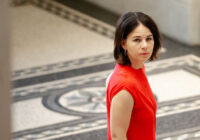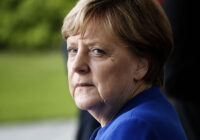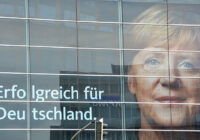Adhering to a nostalgia for a more stable time, many observers see in the end of Merkel’s era the beginning of a dystopian future of political turmoil.
Six years ago, in November 2012, Angela Merkel was at the height of her domestic and European power. At the domestic level, Germany was perceived as an “island of happiness” and the anchor of political and economic stability in Europe. Alternative for Germany (AfD) didn’t exist, and Merkel’s party, the conservative Christian Democratic Union (CDU), was stable around 40% in the polls. Inside her party, one of her last popular opponents, Christian Wulff, had just lost his prestigious job as German president in an unprecedented media scandal.
Almost desperately pushed by the media as a more politically passionate but equally competent politician, Merkel’s only challenger was the recently elected social democratic candidate for chancellor, Peer Steinbrück. However, his difference appeared to many more as one of style than of substance. As a finance minister under Merkel, Steinbrück had largely supported her economic policy choices on the national and European level. In the elections a year later he was to deliver a mediocre electoral performance and disappear from the German political stage. After the 2013 elections, German parliament was far from being a source of heated political debates and fragmentation. Instead, it was a four-party body with the social democratic SPD and Merkel’s CDU representing more than 75% of German voters.
On the European level, François Hollande had just been elected president of France, too early to challenge Merkel’s increasing political power in the EU. While southern Europe was in the strong grip of the euro crisis and went through a series of political upheavals, Merkel’s popularity was at an all-time high, Germany’s economic performance stable and no political instability in sight. In short, all was well at home.
Merkiavelli’s Power
It was in this context that Ulrich Beck, one of the most prominent German sociologists, published an influential essay in Der Spiegel arguing that Merkel’s awe-inspiring power was built on being loved at home and feared in Europe. Entitled “Merkiavelli’s Power,” the essay claims that Merkel makes use of a Machiavellian style of politics aimed at nothing but the preservation of power at all costs.
Indeed, Merkel came to be the embodiment of “alternativelessness” or, in other words, an apolitical form of politics that defends its political choices as an apolitical managing of necessities that threaten power — Merkel’s and the CDU’s at home, Germany’s in the EU. At the domestic level, this meant taming any rising opposition by closely following the polls and quickly incorporating political choices that could turn out to be a future threat to Merkel and the CDU. The dramatic change in energy policy after the Fukushima catastrophe in Japan in 2011 is only one example.
At the European level it meant asserting German national interest by cladding it into the efforts to build the European project. In face of the aftermath of the 2008 financial crisis, German-style austerity was presented as a necessary policy for a stable Europe. As a consequence of Merkel’s ambiguity and unclear positioning, she appeared as a conservative to some Germans, as a “green-left-liberal” to others, a staunch defender of the EU and the free world to her admirers in Europe, and a dictator of German interests to her critics. This is because at its climax, Merkel’s power was exactly to veil political choices and position in a language of managerial necessity and the need for stability. The cost: an increasing feeling that politics were a thing of the past, or, at best, a nostalgic strategy of populist parties.
Six years later, Merkel’s and others’ appeals to stability appear weirdly anachronistic and nostalgic themselves. Not only has the power balance in Germany shifted from a CDU hegemony to increasing political fragmentation and polarization, with the AfD and the Green Party as its main profiteers. At the European and international level, US President Donald Trump and Brexit have equally dramatically altered the landscape, while Matteo Salvini, Italy’s far-right interior minister, plays with the thought to run for EU commission president to change the union from within.
Adhering to a nostalgia for a more stable time, many observers see in the end of Merkel’s era the beginning of a dystopian future of political turmoil, European chaos and even a new era of fascism. But instead we should see Merkel’s farewell to politics as a symbol for a return of politics — a return that has announced itself in the formation of the AfD, the resistance against another SPD/CDU coalition or the election of Syriza in Greece and Brexit in the UK; a return of clearly-stated ideas on where Germany and the EU should head politically; and a return of politicians that try to convince through political argument and not by appealing to necessity.
Stability and Politics
Important political decisions on the national and the European level lie ahead. Politics should not be left to the extreme factions only to allow these to present themselves as the only alternative. While the AfD have found its role in a changing German political landscape, the CDU and SPD are still torn between stability and politics, between the heritage of the Merkel years and a fresh start with new political faces and new political ideas for the future of Germany and Europe. The fact that the CDU now faces the first debate on its political leadership in more than 40 years and the number and variety of candidates that have bid for becoming Merkel’s successor shows that even in the CDU — a party known for its preference of unity over internal political dispute — there is quite a demand for political choice.
Merkel’s Merkiavellism is not at the root of today’s upheaval. Rather it was the expression of a highly popular approach to politics at its time, one that was carried by general and widespread weariness of old 20th -century ideological battles and the search for sober and pragmatic policymaking. Yet the challenges ahead need political leadership, choice, decision-making and the changes we face, shape and opt for popular support.
As Beck argues at the end of his 2012 essay: “Germany stands before the decision over the being or non-being of Europe. It has simply become too powerful to afford the luxury not to take a decision.” In the face of Brexit, unanswered French plans for the EU and plans for a far-right takeover of the EU, this is even more true today than it was back then. After Angela Merkel, the coming political generation needs to take up this responsibility, develop and promote different political futures and not leave it to the far right.
*[The Centre for Analysis of the Radical Right is a partner institution of Fair Observer.]
The views expressed in this article are the author’s own and do not necessarily reflect Fair Observer’s editorial policy.
Support Fair Observer
We rely on your support for our independence, diversity and quality.
For more than 10 years, Fair Observer has been free, fair and independent. No billionaire owns us, no advertisers control us. We are a reader-supported nonprofit. Unlike many other publications, we keep our content free for readers regardless of where they live or whether they can afford to pay. We have no paywalls and no ads.
In the post-truth era of fake news, echo chambers and filter bubbles, we publish a plurality of perspectives from around the world. Anyone can publish with us, but everyone goes through a rigorous editorial process. So, you get fact-checked, well-reasoned content instead of noise.
We publish 2,500+ voices from 90+ countries. We also conduct education and training programs
on subjects ranging from digital media and journalism to writing and critical thinking. This
doesn’t come cheap. Servers, editors, trainers and web developers cost
money.
Please consider supporting us on a regular basis as a recurring donor or a
sustaining member.
Will you support FO’s journalism?
We rely on your support for our independence, diversity and quality.






